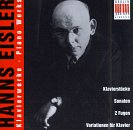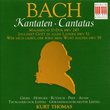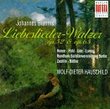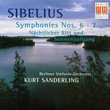| All Artists: Donald Martino, Hanns Eisler, Torbjorn Lundquist, Norman Symonds, Siegfried Stockigt, Walter Olbertz, Gerhard Erber Title: Hanns Eisler: Works For Piano Members Wishing: 0 Total Copies: 0 Label: Berlin Classics Release Date: 4/22/1997 Genre: Classical Styles: Chamber Music, Forms & Genres, Sonatas, Theatrical, Incidental & Program Music, Historical Periods, Classical (c.1770-1830), Modern, 20th, & 21st Century, Instruments, Keyboard Number of Discs: 2 SwapaCD Credits: 2 UPC: 782124923525 |
Search - Donald Martino, Hanns Eisler, Torbjorn Lundquist :: Hanns Eisler: Works For Piano
 | Donald Martino, Hanns Eisler, Torbjorn Lundquist Hanns Eisler: Works For Piano Genre: Classical |
Larger Image |
CD DetailsSimilar CDs |
CD ReviewsEisler at the piano is fascinating yet not his primary focus 04/09/1999 (5 out of 5 stars) "Eisler's piano music must be takened within the context that he wrote best only with a program or with a text. But prior to his political engagements in Germany, where the Nazis put a price on his head, the "First Sonata" out does the piano music of its time. The Berg "Sonata" has erroneously forshadowed Eisler's and naturally Schoenberg who was more vigorous and abstract. It seemed no one had a monopoly however on the darkness all this piano repertoire reflected the earlier part of this century. Eisler's "First Sonata" is fast-paced, very exciting for the ears with a continuous momentum,trills and leaping registers almost toccata-like. It's also very compact, an important Eisler trait and again to my mind beats to hell the Berg. When we jump to the "Third Sonata" from 1943 we have an Eisler now living in exile in the Pacific Palisades near Los Angeles. And it is curious that all the sunshine there did nothing to effect the darkness and the ugliness that is part of the"Third".Olbertz plays with great discipline not lingering anywhere yet jettisoning his hands in the right registers. When Eisler returned to now the DDR, East Germany he was ignored by the apprarachik authorities in spite of the fact that he wrote their National Anthem. The "Variations" here was Eisler's attempt at a reconciliation of the state of the musical world. He always maintained that the future of music had to contain an element of accessibility,of direct communication, yet not simple-minded nor effects for the mere sake of effects, nor intellectualizing for no real musical end, all sins of current postmodernity. The result for Eisler is really too academic for now he is away from the dangers of the front lines of struggle,living in relative quiet and abandonment,all this must have effected his creativity. All of Eisler's piano music is traditionally bound with never more than two voices at work with a high sense of vigour and drama."
|





